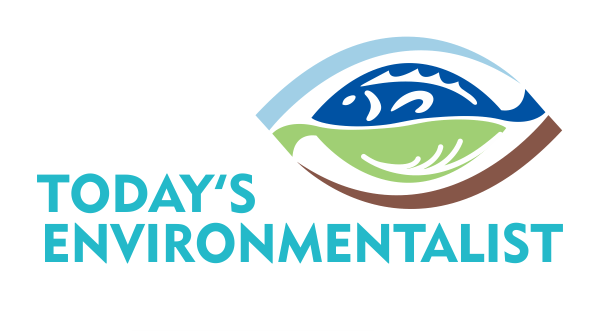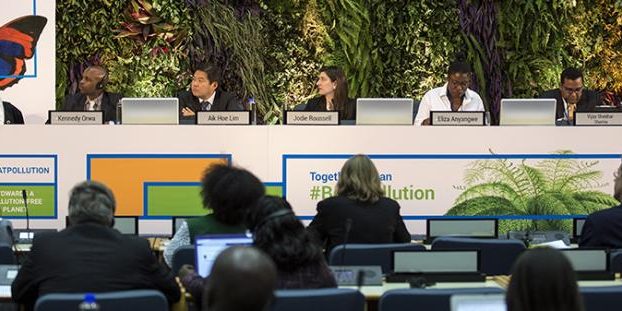Air pollution is the biggest environmental health risk of our time, affecting more than 90 per cent of the global population on a daily basis.
But the good news is that we are developing the tools we need to tackle this problem: clean technologies hold immense potential to fight against pollution. They also offer new opportunities for growth, income and jobs.
Trade can scale up the use of clean technologies by opening markets and stimulating innovation. This brings down the cost of these technologies through economies of scale, thereby making them more accessible to less developed countries.
This week, policymakers and business leaders are gathering at the United Nations Environment Assembly to discuss the role of trade in scaling up clean technologies. They are calling for joint action to remove barriers and foster partnerships. A high-level dialogue titled “Unlocking Trade in Environmentally Sound Technologies to Tackle Air Pollution” took place on the first day of the Assembly spurring lively debate among participants.
“In the big picture, it’s all about decoupling economic growth from the use of natural resources and environmental impact. We have the technological solutions, now we need to scale them up. We need to stop subsidizing environmental bads and go ahead with fossil fuel subsidy reform,” said Kimmo Tiilikainen, Minister of the Environment, Energy and Housing of Finland, who opened the event. The Minister continued, “together, we can unlock trade to implement the Paris Agreement and the Sustainable Development Goals (SDGs).”
“In the big picture, it’s all about decoupling economic growth from the use of natural resources and environmental impact. We have the technological solutions, now we need to scale them up.”
He was joined by Mr. Alvaro Cedeño, Ambassador of Costa Rica to the World Trade Organization, who shared his country’s experience in promoting trade in green goods and services as a way to advance the goals of the Paris Agreement on climate change and the 2030 Agenda for Sustainable Development.
Mr. Joshua Oigara, CEO and Managing Director of Kenya Commercial Bank, provided local context, drawing attention to Kenya’s progress in unlocking trade in clean technology as key tool to meet the SDGs. He called for more transparent and sustainable trade, long-term investments in sustainability and strong partnerships.
Ambassador Cedeño also supported the call for partnership to catalyze action that will lead the transition to greener, cleaner, and more sustainable trade. “We have multiple tools, with different applications. It’s time for the ‘Friends of Clean Techs’ to come together and apply them to the trade agenda,” the Ambassador asserted.
The call was echoed by industry bodies. Ms. Jodie Roussell, Chief Executive Officer of the Global Solar Council, underlined the arising opportunities. “Incentivizing trade in green technologies like solar energy enables countries to build distributed, clean infrastructure to power the next 30 years of growth. Addressing key challenges in national markets like the skills gap for local services, power purchaser risk and trade barriers will go a long way to opening the doors to a sustainable energy sector transformation. Closing the skills gap is particularly important as 75% of the jobs in the clean technology sector are in services, such as installation and maintenance,” affirmed Ms. Roussell.
The event also brought together Mr. Jorge Rodriguez Romero, Deputy Head of the Unit of Multilateral Environmental Cooperation in the European Commission’s Directorate-General for the Environment; Mr. Aik Hoe Lim, Director of the Environment and Trade Division at the World Trade Organization; Mr. Kennedy Orwa, Acting Executive Director of the African Centre for Technology Studies; and Mr. Vijay Shekhar Sharma, Founder and CEO of paytm, India’s largest mobile-first financial services conglomerate.
“Incentivizing trade in green technologies like solar energy enables countries to build distributed, clean infrastructure to power the next 30 years of growth.”
“Green business makes sense,” stated Ambassador Cedeño, who was joined by other speakers in emphasizing the potential and opportunities to create win-win-situations through trade in environmentally sound technologies. “In the narrative on clean technology for development, environment needs to be at the core,” he continued. Mr. Orwa specifically called for “the development of targeted policies that will accelerate the investment in green technologies in Africa,” underscoring a key ingredient to unlock such potential.
Panelists highlighted the tremendous potential for developing countries to join global value chains of clean technologies. “Trade in clean technologies is critical for Africa and we have great potential, especially in the solar sector. Africa needs to fully harness this,” urged Mr. Orwa. A UN Environment study found that South-South trade in renewable energy grew at a rate of about 30 per cent annually in the last decade, faster than global trade in the same sectors. Today, South-South trade in renewable energy products makes up more than one quarter of all global trade in this sector. In 2007, developing countries transformed from being net importers to net exporters of renewable energy goods.
Speakers also identified barriers and challenges hampering trade in clean technologies, such as tariffs, subsidies to fossil fuels, local content requirements and trade defense measures.
“Trade in clean technologies is critical for Africa and we have great potential, especially in the solar sector. Africa needs to fully harness this.”
“Most of our exports, especially to developed markets, have often faced tariff and non-tariff barriers, thereby limiting market access,” emphasized Mr. Oigara, arguing that the adoption of new technology must be linked to market access. According to World Bank estimates, the elimination of tariffs and non-tariff barriers in clean technologies could lead to a 14 per cent increment in the trade volume of clean coal, wind, solar, and energy-efficient lighting. Besides removing barriers, there is a need to create trade rules that support sustainable development. The discussion concluded with a strong call for joint action from both public and private sectors.
Background
The 2030 Agenda and the Paris Agreement provide an impetus for development, innovation and trade in environmentally sound technologies, which can address air pollution and climate change while creating new economic opportunities, jobs and social benefits.
International trade is a critical enabler for the dissemination of clean technologies. Unlocking trade in clean technologies can not only spur proliferation and stimulate innovation but also improve energy access and security.
Global trade in environmental goods is projected to grow to $1.9 trillion by 2020. With the successful implementation of international measures such as the Environmental Goods Agreement (the negotiations of which are currently stalled), projections even go up to $3 trillion. Developing countries increasingly outpace industrialized economies in terms of renewable energy investment, and can harness benefits from increased trade in environmentally sound technologies. Particularly, enhancing the trade and uptake of clean technologies can result in numerous benefits for development and the environment, ranging from reduced air and water pollution to improved energy efficiency.
Yet tariff and non-tariff barriers widely hamper trade in technology, and thus its diffusion. In order to enhance trade in environmentally sound technologies and augment access to such technologies, it is crucial to address trade-related barriers, improve coherence between environmental policy and trade policy, enhance the capacities of developing countries to harness trade opportunities, and connect to global green value chains.








